Works by Carson McCullers
She struck literary gold with her first novel at age 23. What did she write after that—and how was it similar to The Heart Is a Lonely Hunter? Discover Carson's perfect little canon here.
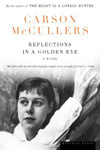
Reflections in a Golden Eye (1941)
By Carson McCullers
Reflections in a Golden Eye, published just a year after the debut Carson McCullers's masterpiece, The Heart Is a Lonely Hunter, confirmed the author's youthful genius. Set on an army base in the American South of the 1930s, Reflections in a Golden Eye tells the story of Captain Penderton, his tempestuous and flirtatious wife, Leonora, and the passions and jealousies that ensue with the arrival of Major Morris Langdon and the fragile Alison Langdon. The novel is infused with McCullers's signature themes of loneliness in marriage and the emotional vicissitudes of life in the South.
By Carson McCullers
Reflections in a Golden Eye, published just a year after the debut Carson McCullers's masterpiece, The Heart Is a Lonely Hunter, confirmed the author's youthful genius. Set on an army base in the American South of the 1930s, Reflections in a Golden Eye tells the story of Captain Penderton, his tempestuous and flirtatious wife, Leonora, and the passions and jealousies that ensue with the arrival of Major Morris Langdon and the fragile Alison Langdon. The novel is infused with McCullers's signature themes of loneliness in marriage and the emotional vicissitudes of life in the South.
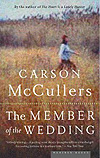
The Member of the Wedding (1946)
By Carson McCullers
The novel that became an award-winning play and a major motion picture and that has charmed generations of readers, Carson McCullers's classic The Member of the Wedding tells the story of the inimitable 12-year-old Frankie, who is utterly, hopelessly bored with life until she hears about her older brother's wedding. Bolstered by lively conversations with her house servant, Berenice, and her 6-year-old male cousin—not to mention her own unbridled imagination—Frankie takes on an overly active role in the wedding. She hopes even to go, uninvited, on the honeymoon, so deep is her desire to be the member of something larger, more accepting than herself. The Member of the Weddings showcases McCullers at her most sensitive, astute, and lasting best.
By Carson McCullers
The novel that became an award-winning play and a major motion picture and that has charmed generations of readers, Carson McCullers's classic The Member of the Wedding tells the story of the inimitable 12-year-old Frankie, who is utterly, hopelessly bored with life until she hears about her older brother's wedding. Bolstered by lively conversations with her house servant, Berenice, and her 6-year-old male cousin—not to mention her own unbridled imagination—Frankie takes on an overly active role in the wedding. She hopes even to go, uninvited, on the honeymoon, so deep is her desire to be the member of something larger, more accepting than herself. The Member of the Weddings showcases McCullers at her most sensitive, astute, and lasting best.
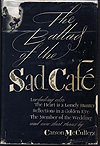
The Ballad of the Sad Café (1951)
By Carson McCullers
Several stories and a major novella published by Carson ten years after her major masterpiece. It contains several stories, including: a grotesque human triangle in a primitive Southern town; a young boy learning the difficult lessons of manhood; an experience in a fateful encounter with his native land and former love. These are parts of the world of Carson McCullers—a world of the lost, the injured, the eternal strangers at life's feast. Here are brilliant revelations of love and longing, bitter heartbreak and occasional happiness—tales that probe the very heart of human existence. Here is the artistry, compassion and pitiless insight of one of the truly great writers of our time.
By Carson McCullers
Several stories and a major novella published by Carson ten years after her major masterpiece. It contains several stories, including: a grotesque human triangle in a primitive Southern town; a young boy learning the difficult lessons of manhood; an experience in a fateful encounter with his native land and former love. These are parts of the world of Carson McCullers—a world of the lost, the injured, the eternal strangers at life's feast. Here are brilliant revelations of love and longing, bitter heartbreak and occasional happiness—tales that probe the very heart of human existence. Here is the artistry, compassion and pitiless insight of one of the truly great writers of our time.
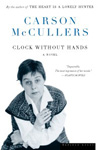
Clock Without Hands (1953)
By Carson McCullers
Set in small-town Georgia on the eve of court-ordered integration, Clock Without Hands is Carson McCullers's final masterpiece and her most poignant statement on race, class, and individual responsibility. The actors in this allegory are J. T. Malone, a lonely, dying middle-aged druggist looking to redeem his misspent life; Fox Clane, a corrupt old judge and defender of the ways of the Old South; Jester Clane, the judge's orphaned grandson, a directionless adolescent with a strong sense of social justice; and Sherman Pew, an angry, blue-eyed black youth in search of his own identity. Their interlocking stories are told with that unique mix of humor, irony, power, and love that marks all of McCullers's writing.
By Carson McCullers
Set in small-town Georgia on the eve of court-ordered integration, Clock Without Hands is Carson McCullers's final masterpiece and her most poignant statement on race, class, and individual responsibility. The actors in this allegory are J. T. Malone, a lonely, dying middle-aged druggist looking to redeem his misspent life; Fox Clane, a corrupt old judge and defender of the ways of the Old South; Jester Clane, the judge's orphaned grandson, a directionless adolescent with a strong sense of social justice; and Sherman Pew, an angry, blue-eyed black youth in search of his own identity. Their interlocking stories are told with that unique mix of humor, irony, power, and love that marks all of McCullers's writing.

Sweet as a Pickle and Clean as a Pig (1964)
By Carson McCullers
This collection of children's verse written shortly before her death was dedicated to children she knew and loved: Emily and Dara Altman, the children of her friend and lawyer Floria Lasky, and her agent's son, Tony Lantz. With this volume, Carson insisted on calling her verses rhymes instead of poems because they were unlike any of her earlier published poetry.
By Carson McCullers
This collection of children's verse written shortly before her death was dedicated to children she knew and loved: Emily and Dara Altman, the children of her friend and lawyer Floria Lasky, and her agent's son, Tony Lantz. With this volume, Carson insisted on calling her verses rhymes instead of poems because they were unlike any of her earlier published poetry.
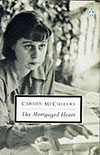
The Mortgaged Heart (1971)
By Carson McCullers
Edited by her sister Margarita G. Smith, this first collection of Carson's short fiction to be published after her death included critical comments by Sylvia Chatfield Bates, one of Carson's mentors. Of the ten pieces included in the collection, only "Sucker" and "Wunderkind" had been published during the author's lifetime.
By Carson McCullers
Edited by her sister Margarita G. Smith, this first collection of Carson's short fiction to be published after her death included critical comments by Sylvia Chatfield Bates, one of Carson's mentors. Of the ten pieces included in the collection, only "Sucker" and "Wunderkind" had been published during the author's lifetime.
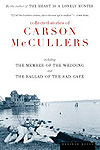
The Collected Stories of Carson McCullers (1987)
By Carson McCullers
Though best known for her novels, Carson McCullers was also a writer of dazzling short fiction. The novellas and stories collected here span her entire career, from her apprenticeship in the nineteen-thirties through her years of mastery in the forties and fifties. They explore her signature themes: wounded adolescence, loneliness in marriage, the human comedy as played in the American South. Though her subject matter is often grotesque and her situations extreme, McCullers is not a sensationalist; she is instead a poet and a symbolist, a kind of second Hawthorne, a seeker after the luminous meanings behind the things of this world.
By Carson McCullers
Though best known for her novels, Carson McCullers was also a writer of dazzling short fiction. The novellas and stories collected here span her entire career, from her apprenticeship in the nineteen-thirties through her years of mastery in the forties and fifties. They explore her signature themes: wounded adolescence, loneliness in marriage, the human comedy as played in the American South. Though her subject matter is often grotesque and her situations extreme, McCullers is not a sensationalist; she is instead a poet and a symbolist, a kind of second Hawthorne, a seeker after the luminous meanings behind the things of this world.
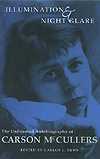
Illumination and Night Glare: The Unfinished Autobiography of Carson McCullers (2002)
By Carson McCullers
Edited by Carlos L. Dews
McCullers—one of the most gifted writers of her generation—died of a stroke at the age of 50 before finishing this, her last manuscript. Editor Carlos L. Dews has faithfully brought her story back to life, complete with never-before-published letters between McCullers and her husband Reeves, and an outline of her most famous novel, The Heart Is a Lonely Hunter.
Looking back over her life from a precocious childhood in Georgia to her painful decline from a series of crippling strokes, McCullers offers poignant and unabashed remembrances of her early writing success, her family attachments, a troubled marriage to a failed writer, friendships with literary and film luminaries (Gypsy Rose Lee, Richard Wright, Isak Dinesen, John Huston, Marilyn Monroe), and her intense relationships with the important women in her life. When the author was interviewed by Rex Reed on her final birthday, McCullers revealed her reason for writing an autobiography:
"I think it is important for future generations of students to know why I did certain things, but it is also important for myself. I became an established literary figure overnight, and I was much too young to understand what happened to me, or the responsibility it entailed. I was a bit of a holy terror. That, combined with all my illnesses, nearly destroyed me. Perhaps if I trace and preserve for other generations the effect this success had on me it will affect future artists to accept it better."
By Carson McCullers
Edited by Carlos L. Dews
McCullers—one of the most gifted writers of her generation—died of a stroke at the age of 50 before finishing this, her last manuscript. Editor Carlos L. Dews has faithfully brought her story back to life, complete with never-before-published letters between McCullers and her husband Reeves, and an outline of her most famous novel, The Heart Is a Lonely Hunter.
Looking back over her life from a precocious childhood in Georgia to her painful decline from a series of crippling strokes, McCullers offers poignant and unabashed remembrances of her early writing success, her family attachments, a troubled marriage to a failed writer, friendships with literary and film luminaries (Gypsy Rose Lee, Richard Wright, Isak Dinesen, John Huston, Marilyn Monroe), and her intense relationships with the important women in her life. When the author was interviewed by Rex Reed on her final birthday, McCullers revealed her reason for writing an autobiography:
"I think it is important for future generations of students to know why I did certain things, but it is also important for myself. I became an established literary figure overnight, and I was much too young to understand what happened to me, or the responsibility it entailed. I was a bit of a holy terror. That, combined with all my illnesses, nearly destroyed me. Perhaps if I trace and preserve for other generations the effect this success had on me it will affect future artists to accept it better."



